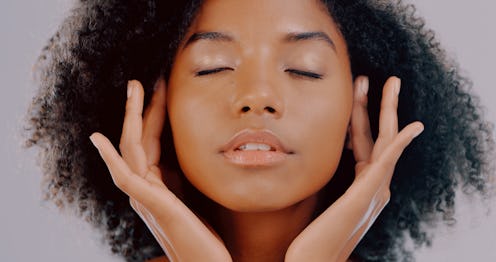(Beauty)
Why Self-Care In The Time Of Social Distancing Is So Important For Me

If someone told me that I'd be spending my spring equinox on my couch instead of jet-setting from island to island, I wouldn't believe them. Yet, here I am, in a constant state of deep thought reflecting on the state of our world, concerned about the spread of COVID-19. It's been a daunting time to say the least, as all of the constant uncertainty serves as a an unwelcome trigger to my pre-existing (and often debilitating) anxiety. However, as I adjust with the billions of my fellow global citizens, I've found that self-care during social distancing is a glimmer of hope during what has potential to be a bleak time for my mental.
Admittedly, I'm someone who thrives off of social interactions. I'm a proud fixture at happy hours, brunches, and parties... you name it. The inability to distract myself with face-to-face contact is proving tremendously difficult. Instead, mimosa toasts have been substituted with Twitter thread deep-dives and aimless Instagram swipes. Judging from my feeds, I know I'm not alone. But it didn't take long for me to realize that distractions paired with the stress would only snowball.
"For a lot of clients I work with, this is a difficult time for a lot of reasons," Brooklyn-based therapist Melissa Ifill, LCSW, tells me. "If you have a history of trauma or mental health diagnosis that you've been working through, having a schedule filled with places to go and things to do can really support you in your wellness." One of the tools that Ifill teaches are distractions (of a productive variety), as well as post-social skill building. "Being around people and doing things can very much help in not keeping you in a constant state of depression," she notes.
It explains my terror at not being able to maintain the routine I'm used to. As someone who already works from home from day-to-day, social interaction has become a form of self-care in itself for me. It serves as a needed break from my days of seclusion. Now that those days don't end, the anxiety that I once felt has been compounded. So in my small window of experimentation, I've found that self-care has has the power to bring a temporary feeling of calm in the midst of the madness.
But what does self-care look like? For me, it's more than just face masks and bubble baths. It starts with a simple concept: 30-minute increments. While scrolling Twitter I came across a thread explaining this life-hack for peak productivity. It insists that giving your complete and undivided attention to a task for 30 minutes, then shifting your focus for another 30 is a wonderful way to provide structure as well as take off some of the stress, and it has. And the experts agree, now more than ever, that order is paramount. "During times like this, make a schedule," Ifill suggests. "Control what you can control. Think of the things that you may typically be doing outside the home and think of ways to do those things inside of the home." And Dr. Amy Shah, MD, an Arizona-based practitioner, agrees. "Schedules are imperative even when times aren't like this, so now more than ever it's important to commit yourself to organizing your time. It's a way to feel powerful during a period that many are feeling powerless."
Reclaiming control looks a little like this for me: It begins with a hot 30-minute morning shower, with no rushing. Once I've bathed, I meditate for 10 minutes as the water continues to flow. After, I begin my work day, sure to break every two hours — dividing those two hours into 30-minute sections — to take a brisk 30-minute walk around the block to reset and get some fresh air. Once work for the day is done, I try to get moving. I spend an hour split halfway between cardio and strength training, giving it all I've got. Once 7 p.m. hits, I unwind with a glass of wine — or three — and make it a point to FaceTime and connect with friends or family for an hour or two. As 9 p.m. rolls around, I begin my nightly routine, which includes hair maintenance and — OK, yes — a face mask, to cap things off.
Then finally, I simply sit. Still and alone for as long as I need at night, gathering my thoughts, praying, reflecting on what's happening in the world, looking forward to brighter days and months ahead. With all the time in the world, I'm learning more about myself than I ever knew, and am confident I'll come out of this healthier mentally and physically than ever before.
But what happens after this passes? Ifill says that the return to a semblance of normalcy doesn't mean the self-care should stop. "It would be to the benefit to everyone, us, employers, employees, if the transition back into things was slow," she says. "We have this expectation that we're going to walk outside and be great but things will feel different, we might see ourselves different. There may be people that we wanted to be present for you who weren't so your relationships may look different. So take it slow."
If you think you’re showing symptoms of coronavirus, which include fever, shortness of breath, and cough, call your doctor before going to get tested. If you’re anxious about the virus’s spread in your community, visit the CDC for up-to-date information and resources, or seek out mental health support.